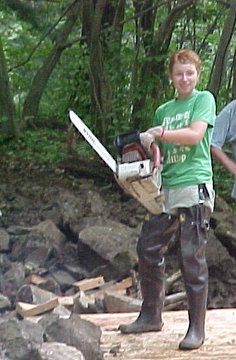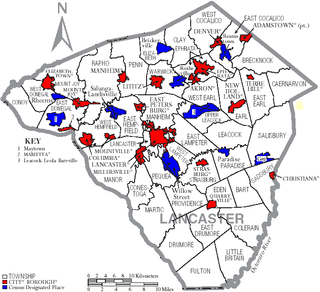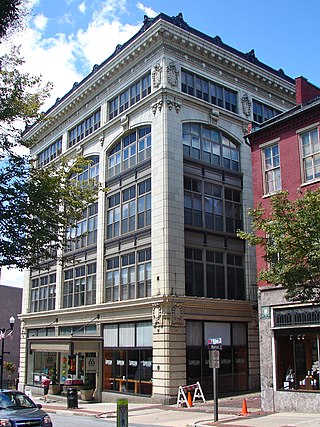
Lancaster County, sometimes nicknamed the Garden Spot of America or Pennsylvania Dutch Country, is a county in the Commonwealth of Pennsylvania. It is located in the south central part of Pennsylvania. As of the 2020 census, the population was 552,984. Its county seat is Lancaster. Lancaster County comprises the Lancaster, Pennsylvania metropolitan statistical area.

Lancaster is a city in and the county seat of Lancaster County, Pennsylvania, and one of the oldest inland cities in the United States. With a population at the 2020 census of 58,039, it ranks 11th in population among Pennsylvania's municipalities. The Lancaster metropolitan area population is 552,984, making it the 104th-largest metropolitan area in the U.S. and second-largest in the South Central Pennsylvania area.

Lititz is a borough in Lancaster County, Pennsylvania, United States, 9 miles (14 km) north of the city of Lancaster. As of the 2020 census, it had a population of 9,370.

Scouting in Pennsylvania has a long and rich tradition, from 1908 to the present day, serving thousands of youth in programs that suit the environment in which they live.

The Brethren Church is an Anabaptist Christian denomination with roots in and one of several groups that trace its origins back to the Schwarzenau Brethren of Germany.
A trade association, also known as an industry trade group, business association, sector association or industry body, is an organization founded and funded by businesses that operate in a specific industry. An industry trade association participates in public relations activities such as advertising, education, publishing, lobbying, and political donations, but its focus is collaboration between companies. Associations may offer other services, such as producing conferences, holding networking or charitable events, or offering classes or educational materials. Many associations are non-profit organizations governed by bylaws and directed by officers who are also members.

The Susquehannock, also known as the Conestoga, were an Iroquoian people who lived in the Susquehanna River watershed in what is now Pennsylvania. Their name means “people of the muddy river.”

The Conestoga River, also referred to as Conestoga Creek, is a 61.6-mile-long (99.1 km) tributary of the Susquehanna River flowing through the center of Lancaster County, Pennsylvania, United States.

Armstrong World Industries, Inc. is a Pennsylvania corporation incorporated in 1891. It is an international designer and manufacturer of wall and ceiling building materials. Based in Lancaster, Pennsylvania, AWI has a global manufacturing network of 26 facilities, including nine plants dedicated to its WAVE joint venture. In 2011, Armstrong's net sales were $2.86 billion, with operating income of $239.2 million.

The Conestoga Valley School District is a school district covering East Lampeter Township, Upper Leacock Township and West Earl Township in Lancaster County, Pennsylvania. It is a member of Lancaster-Lebanon Intermediate Unit (IU) 13. The district operates one High School, one Middle School and four Elementary Schools.

Transportation in Lancaster County, Pennsylvania has a long and variegated history. An early-settled part of the United States, and lying on the route between Philadelphia and Harrisburg, it has been the site of early experiments in canals, railroads, and highways. Before all these, at least ten Native American paths crossed parts of the county, many connecting with the Susquehannock village of Conestoga.

Pennsylvania Route 23 is an 81.14-mile-long (130.58 km) state highway in southeastern Pennsylvania. The route begins at PA 441 in Marietta and heads east to U.S. Route 1 at City Avenue on the border of Lower Merion Township and Philadelphia. PA 23 begins at Marietta in Lancaster County and continues east to Lancaster, where it passes through the city on a one-way pair of streets and intersects US 222 and US 30.

Pennsylvania Route 462 is a 32-mile-long (51 km) east–west state route in York and Lancaster counties in central Pennsylvania. The western terminus is west of York, and the eastern terminus is east of Lancaster. At both ends, PA 462 terminates at U.S. Route 30, which follows a mostly freeway alignment parallel to the north between York and Lancaster. The route heads east into York, where it follows the one-way pair of Market Street eastbound and Philadelphia Street westbound. In York, PA 462 runs concurrent with PA 74 and crosses Interstate 83 Business. East of York, the route becomes a multilane road that has an interchange with I-83 and crosses PA 24. PA 462 continues east through Hallam to Wrightsville and passes through that town before it crosses the Susquehanna River and runs through Columbia. East of here, the route continues through Mountville before reaching the city of Lancaster. In Lancaster, PA 462 is routed on the one-way pair of King Street eastbound and Walnut Street westbound, with the westbound direction concurrent with PA 23. The route crosses US 222/PA 272 and northbound PA 72 in Lancaster. East of Lancaster, PA 462 becomes a multilane road again and continues to its eastern terminus.

Pennsylvania Route 741 is a 26.3-mile-long (42.3 km) state highway that runs through western and southern Lancaster County in the U.S. state of Pennsylvania. The western terminus is along Rohrerstown Road north of an intersection with Commercial Avenue near East Petersburg. The eastern terminus is at PA 41 in Gap. PA 741 heads south from East Petersburg and runs through the western suburbs of Lancaster. The route turns southeast and passes through Millersville before it turns east at New Danville. PA 741 forms a concurrency with U.S. Route 222 between Willow Street and Lampeter before it continues east through farmland in the Pennsylvania Dutch Country that is home to several Amish families, passing through Strasburg before reaching Gap.
Keystone United, formerly known as the Keystone State Skinheads (KSS), is a neo-Nazi group based in Pennsylvania. The Southern Poverty Law Center stated that the group is one of the largest and most active single-state racist skinhead crews in the United States. According to the KSS website, the group had chapters in Harrisburg, Philadelphia, Pittsburgh, Erie, Scranton, Reading, Carlisle, Allentown and other cities in the state. KSS was featured in the National Geographic Channel documentary American Skinheads. In 2008, KSS changed its name to Keystone United. The number of its members remains unknown. The group's logos are a pit bull or a bulldog bordered by a chain or a Keystone symbol in the colors of the Nazi flag.
The Pennsylvania Library Association (PaLA) is the professional association for librarians in the U.S. state of Pennsylvania. It represents about 2,000 members affiliated with public, academic, special, and school libraries throughout the state, and was founded in 1901.

The American Foundry Society (AFS) is a professional, technical and trade association for foundries and the broader metal casting industry. The society promotes the interests of foundries to policymakers, provides training for foundry workers, and supports research and technological advancements in foundry science and manufacturing.
The Standard Steel Casting Company, commonly referred to as Thurlow Works, was a steel production and steel casting facility founded in Chester, Pennsylvania in 1883 by shipbuilder John Roach. The company was established primarily to supply steel ingots for Roach's steel mills, which included the Chester Rolling Mill and the Combination Steel and Iron Company, although it also manufactured steel castings. Standard Steel was the first company in the United States to manufacture commercial quantities of steel utilizing the acid open hearth process.

The Atglen and Susquehanna Branch is an abandoned branch line of the Pennsylvania Railroad that ran between Lemoyne and Atglen, Pennsylvania. A portion of the line is now the Enola Low Grade Trail.

Cassius Emlen Urban was a Lancaster, Pennsylvania-based architect. He was the leading architect in Lancaster from the 1890s to the 1920s.















